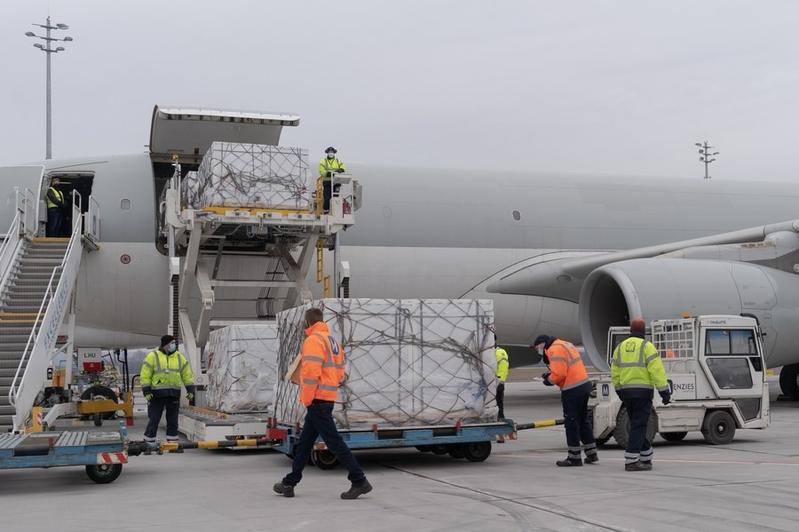 Staff members transfer the first batch of China's Sinopharm COVID-19 vaccine purchased by Hungary at the Liszt Ferenc International Airport in Budapest, Hungary, Feb 16, 2021. (PHOTO / XINHUA)
Staff members transfer the first batch of China's Sinopharm COVID-19 vaccine purchased by Hungary at the Liszt Ferenc International Airport in Budapest, Hungary, Feb 16, 2021. (PHOTO / XINHUA)
Scholars from China and Europe on Tuesday called for solidarity among nations and respect to be accorded to their local human rights conditions as part of efforts against the COVID-19 pandemic.
Right issues must not be allowed to become a political tool for some countries to attack others, they told the China-Europe Seminar on Human Rights. About 150 scholars from China and Europe joined the discussion online and offline at venues in Chongqing and Rome, Italy, in examining the protection of human rights amid the pandemic.
Last year brought one of the toughest tests in modern history as the deadly pandemic wreaked havoc across the world. China quickly waged a "people's war" against the coronavirus and vowed to protect people's lives and health at all costs.
"To realize the great dream of the people of all countries pursuing a happy life and having full enjoyment of human rights, we need to gather the wisdom and strength both in China and Europe," Qiangba Puncog, vice-chairman of the Standing Committee of the 12th National People's Congress, said at the opening ceremony of the forum.
China has dispatched COVID-19 vaccines and syringes to 66 countries and one international organization as of Sunday amid efforts to provide aid and strengthen international cooperation, according to the Ministry of Commerce
ALSO READ: Nation pushes overseas vaccine production
"We need to strengthen communication, enhance mutual trust, and seek common ground while reserving differences," said Qiangba, who is also the president of the China Society for Human Rights Studies.
Luca Rizzo Nervo, a member of the Italian parliament who is also on the Health Committee of the National Assembly, said via video link that all the countries should invest more on infection prevention and control and work together on scientific research into the pandemic. "We should have a global strategy to fight the virus and recover our economy."
Shyami Puvimanasinghe, an officer from the Office of the United Nations High Commissioner for Human Rights, said that only through solidarity can people come together to solve global issues and realize human rights.
China has dispatched COVID-19 vaccines and syringes to 66 countries and one international organization as of Sunday amid efforts to provide aid and strengthen international cooperation, according to the Ministry of Commerce.
Challenges faced
Zhang Guobin, vice-chairman of the Charhar Institute, an international relations think tank, said international cooperation against the coronavirus faces many challenges.
"On one hand, the people in underdeveloped regions need assistance from the international community," he said. "On the other hand, some countries and regions have politicized the pandemic prevention and control measures, which greatly hampers cooperation."
READ MORE: China to boost world vaccine supplies
Jose Manuel Duarte de Jesus, a former Portuguese diplomat and researcher at the University of Lisbon, said the European Union should play an important role "as an independent actor, to avoid a Cold War scenario, and to facilitate a fair competition in the economic field especially in the areas of digital transformation and connectivity, as well as in the health sector".
"In terms of human rights, the European Union should respect the culture and tradition of each nation, and avoid using human rights as a lashing weapon, but rather be committed to its enforcement through dialogue with China," he said.
Established by the China Society for Human Rights Studies in 2015, the China-Europe Seminar on Human Rights serves as a platform for communication and cooperation on human rights between experts from China and Europe.


